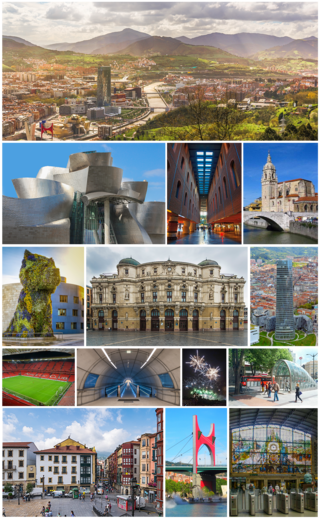
Bilbao is a city in northern Spain, the largest city in the province of Biscay and in the Basque Country as a whole. It is also the largest city proper in northern Spain. Bilbao is the tenth largest city in Spain, with a population of more than 347,000 as of 2023. The Bilbao metropolitan area has 1,037,847 inhabitants, making it the most populous metropolitan area in northern Spain; with a population of 875,552, the comarca of Greater Bilbao is the fifth-largest urban area in Spain. Bilbao is also the main urban area in what is defined as the Greater Basque region.
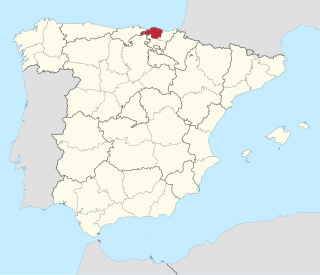
Biscay is a province of Spain and a historical territory of the Vascongadas, heir of the ancient Lordship of Biscay, lying on the south shore of the eponymous bay. The capital and largest city is Bilbao.
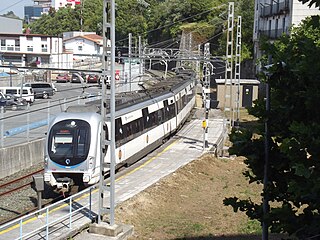
Euskotren Trena, formerly known just as Euskotren is a commuter, inter-city and urban transit train-operating company that operates local and inter-city passenger services in the provinces of Biscay and Gipuzkoa, in the Basque Country, Spain. It is one of the four commercial brands under which Euskotren operates, as a public company managed by the Basque government. The entire 181.1-kilometre (112.5 mi) network uses 1,000 mm narrow gauge rail tracks which have been owned by the Basque Government since their transferral from the Spanish government; the rail tracks and stations were part of the FEVE network until its transferral. Euskotren Trena also operates the Donostia/San Sebastián metro under the brand Metro Donostialdea.

Eibar is a city and municipality within the province of Gipuzkoa, in the Basque Country of Spain. It is the capital of the eskualde / comarca of Debabarrena.

Gipuzkoa is a province of Spain and a historical territory of the autonomous community of the Basque Country. Its capital city is Donostia-San Sebastián. Gipuzkoa shares borders with the French department of Pyrénées-Atlantiques at the northeast, with the province and autonomous community of Navarre at east, Biscay at west, Álava at southwest and the Bay of Biscay to its north. It is located at the easternmost extreme of the Cantabric Sea, in the Bay of Biscay. It has 66 kilometres of coast land.

Miguel Ángel Blanco Garrido was a Spanish politician who was a councillor in Ermua in the Basque Country for the People's Party (PP). He was kidnapped and killed by the separatist group ETA.

José Miguel Beñaran Ordeñana was a Basque militant and a key figure in the political evolution of the Basque separatist organization Euskadi ta Askatasuna (ETA). Often known by his nom de guerreArgala (Slim), he took part in the so called Operation Ogre, which consisted in the assassination of Luis Carrero Blanco, Spain's Prime Minister, in 1973. Five years later, he was in turn assassinated by a car bomb in Anglet, French Basque Country, by a group directed by far right members inside the Spanish Navy. This group reportedly received assistance from people such as former OAS member Jean Pierre Cherid, former Triple A Argentine member José María Boccardo and Italian neofascist Mario Ricci, member of Avanguardia Nazionale.

Atxondo is a municipality located in the province of Biscay, in the Basque Country, Spain. Atxondo is part of the comarca of Durangaldea and has a population of 1,447 inhabitants as of 2007 according to the Spanish National Statistics Institute.

Elorrio is a town and a municipality located in the eastern part of the province of Biscay, in the Basque Country, in northern Spain. As of 2017, it has a population of 7,307 inhabitants. It covers an area of 37.20 square kilometers and it has a population density of 193.58 people per square kilometer. It holds the medieval title of Most Loyal and Noble Villa.

Getxo is a town located in the province of Biscay, in the autonomous community of the Basque Country, in Spain. It is part of Greater Bilbao, and has 77,946 inhabitants (2019). Getxo is mostly an affluent residential area, as well as being the third largest municipality of Biscay.

Mallabia is an elizate, town and municipality located in the province of Biscay, in the Basque Country, northern Spain. Mallabia is part of the comarca of Durangaldea and has a population of 1.135 inhabitants as of 2006 and according to the Spanish National Statistics Institute.

Santurtzi is a port town in the province of Biscay, in the autonomous community of Basque Country, Spain. It is located in the Bilbao Abra bay, near the mouth of the Nervión river, on its left bank, 14 km downriver from Bilbao and forms part of the Greater Bilbao agglomeration. It has a population of 45,853 (2019) and a land area of 6.77 km2.
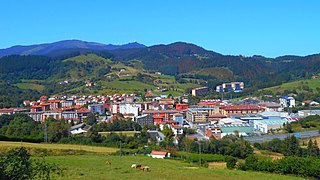
Zaldibar is an elizate, town and municipality located in the province of Biscay, in the Basque Country, Spain. Zaldibar is part of the comarca of Durangaldea and has a population of 3,043 inhabitants as of 2019 and according to the Spanish National Statistics Institute.
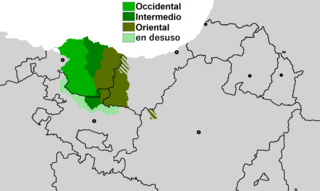
Biscayan, sometimes Bizkaian, is a dialect of the Basque language spoken mainly in Biscay, one of the provinces of the Basque Country of Spain.
The Foro Ermua was a Spanish civic association, the membership of which was composed of Spanish citizens. It was founded on 13 January 1998; its last president was Mikel Buesa.

The Basque Country, also called the Basque Autonomous Community, is an autonomous community in northern Spain. It includes the Basque provinces of Álava, Biscay, and Gipuzkoa. It also surrounds an enclave called Treviño, which belongs to the neighboring autonomous community of Castile and León.

Durangaldea is a comarca of Biscay located in the Basque Country, Spain. It is one of the seven eskualdeak/comarcas or regions that compose the province of Biscay. The capital city of Durangaldea is Durango.

Debabarrena is an eskualdea / comarca located in Gipuzkoa, Basque Country (Spain). It has an area of 180,3 km2. It is north from the comarca of Debagoiena, east from the province of Biscay, and south from the Gulf of Biscay.

María del Mar Blanco Garrido is a Spanish People's Party (PP) politician. She has served as a member of the Basque Parliament (2009–2012), Congress of Deputies (2016–2019) and Assembly of Madrid.






















